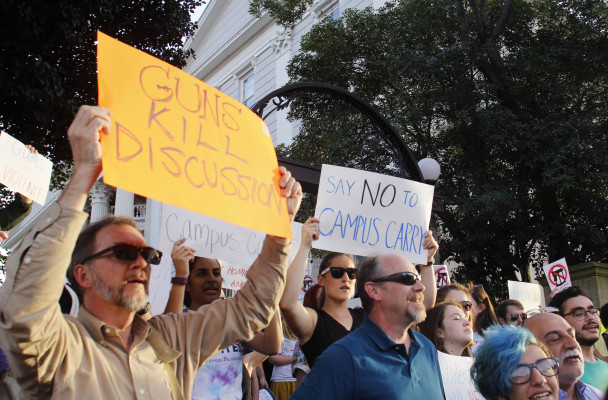
Recent Shootings: How Safe is Campus?
This is the first semester since the passing of the concealed campus carry bill in Georgia. House Bill 280 went into effect July 1, 2017, after a great deal of controversy. This bill goes into effect as mass shootings are increasing across the United States. Three weeks ago, there was a mass shooting at a church in Texas, killing 26 people. Two weeks ago, a gunman opened fire in a California school, killing 4 people. This unpredictability has left students and faculty concerned about what precautions are in place to keep the university safe.

Will more guns on campus fix or worsen this problem? And what should you do if you find yourself in a campus shooter situation?
Here are the changes to be aware of. HB280 allows license gun holders the ability to carry concealed weapons on Georgia college campuses. The policy does exclude concealed weapons on campus from certain areas, such as athletic sporting events, residence halls, childcare facilities, and disciplinary hearings. There are some controversial areas they are allowed in, such as health centers.

UGA police have taken the new changes into account. The University of Georgia Police Department says students will be in violation of student conduct as well as prosecuted for being in violation of any part of the law.

There is anonymity in carrying. Faculty members are not allowed to ask students if they are carrying a handgun. (GA HB280) There’s no way of knowing who is legally carrying a weapon on campus; unfortunately there’s no easy way of knowing who is illegally carrying one either.
Since this is the case, it is important everybody knows what to do in the case of an active shooter. A government program, Ready, has listed what to do in such an event.

In the case of an active shooter, if possible run away from the situation and distance yourself from the scene. You should also warn others headed toward the area of the shooting. If there is no chance of escape, hide and stay quiet. If you are in a room lock the doors and turn off the lights. Fighting is a last resort and if it comes to this, be prepared and commit to your actions. In a close contact situation, this is your best chance for survival. Items such as furniture can be used as weapons and protection.

There are plans in place for when you are un-armed and in an active shooter situation. The guidelines for armed bystanders are still unclear. The Ready plan does have a place for fighting, but does that include shooting? Those arguing for campus carrying legislation used personal safety as an argument. Based off this logic, those concealing a weapon as a good samaritan should shoot back. Many citizens may choose to carry, but lack gun training. In a hectic situation, a good samaritan could accidentally shoot another citizen. With campus carry in place, there is now the possibility of students shooting back. Cross fire could potentially kill twice as many people. If this does become the case, move away from that shooter and follow the same procedures.
University of Georgia police guidelines about weapons on campus can be found here. They encourage anybody with questions or concerns to contact them at (706)-542-2200.